
Theoretical and Applied Ecology
Scope & Guideline
Empowering Ecologists to Shape Environmental Futures
Introduction
Aims and Scopes
- Ecological Assessment and Monitoring:
The journal emphasizes studies that assess ecological conditions and the impacts of human activities on ecosystems, including soil, water, and air quality assessments. - Bioremediation and Pollution Management:
Research on utilizing biological processes to remediate contaminated environments, particularly in relation to oil spills, heavy metal pollution, and wastewater treatment, forms a core part of the journal's focus. - Biodiversity and Conservation:
The journal publishes works on biodiversity assessment, conservation strategies, and the ecological significance of various species and habitats, addressing both theoretical and applied aspects. - Ecological Biotechnology:
Innovative applications of biotechnology in ecological contexts, such as the use of microorganisms for pollution cleanup and sustainable practices in agriculture, are highlighted. - Climate Change and Environmental Dynamics:
The journal explores ecological responses to climate change, including the effects on species distributions, ecosystem functions, and the development of adaptive management strategies.
Trending and Emerging
- Microbial Ecology and Bioremediation:
There is an increasing focus on the role of microorganisms in bioremediation processes, showcasing innovative applications of microbial ecology to address pollution and ecosystem restoration. - Climate Change Adaptation Strategies:
Research exploring adaptive management strategies in response to climate change impacts on ecosystems is gaining traction, emphasizing the need for resilience in ecological planning. - Urban Ecology and Human-Environment Interactions:
Papers examining ecological dynamics in urban environments and the effects of human activity on local ecosystems are trending, reflecting the growing recognition of urban ecology's importance. - Innovative Waste Management Techniques:
The journal is seeing a rise in studies focused on sustainable waste management practices, including the development of eco-friendly technologies and methods for waste recycling and reduction. - Ecological Genetics and Evolutionary Responses:
Emerging research on genetic diversity and evolutionary adaptations in response to environmental changes is becoming increasingly relevant, linking ecological studies with genetic insights.
Declining or Waning
- Traditional Ecological Studies:
Research that primarily focuses on basic ecological principles without direct application to contemporary environmental issues appears to be waning, as there is a growing emphasis on applied and interdisciplinary studies. - Pollution Studies with Limited Scope:
There is a noticeable reduction in papers that solely focus on pollution studies without integrating broader ecological impacts or solutions, indicating a shift towards more holistic approaches. - Historical Ecology:
Themes centered around historical ecological assessments or retrospective studies are becoming less prevalent, as the journal prioritizes research that addresses current ecological challenges and solutions.
Similar Journals

Ecologia Aplicada
Fostering Innovation in Ecological Applications.Ecologia Aplicada is a premier academic journal dedicated to advancing the understanding and application of ecological principles in varied environmental contexts. Published by UNIV NACIONAL AGRARIA LA MOLINA, the journal boasts a commitment to disseminating high-quality research that bridges the gap between theoretical concepts and practical applications in ecology, thereby contributing to sustainable development and environmental conservation practices in Latin America and beyond. With the ISSN 1726-2216 and E-ISSN 1993-9507, Ecologia Aplicada provides a platform for researchers, professionals, and students to publish and access impactful studies that address pressing ecological challenges. While the journal follows a rigorous editorial process, it is particularly notable for its Open Access initiatives, which aim to enhance the availability of crucial ecological research. The journal plays a vital role in enriching the academic community's discourse on ecological issues, encouraging innovative methodologies, and fostering collaborative approaches to ecological problem-solving.

Insect Conservation and Diversity
Transforming Conservation Strategies Through ResearchInsect Conservation and Diversity is an esteemed academic journal dedicated to the field of insect science, published by WILEY in the United Kingdom. With its ISSN 1752-458X and E-ISSN 1752-4598, this journal serves as a vital resource for researchers and professionals striving to advance knowledge in biodiversity and conservation. The journal holds an impressive Q1 ranking in both Ecology, Evolution, Behavior and Systematics and Insect Science as of 2023, which reflects its rigorous peer-review process and significant contributions to the field. Recognized for its high-quality publications, Insect Conservation and Diversity ranks 9th out of 181 in insect science and 72nd out of 721 in ecology within Scopus, placing it in the top tiers of academic journals. Researchers are encouraged to submit their work from 2009 to 2024, enhancing our understanding of insect biodiversity and conservation strategies. Aimed at fostering advancements in knowledge and collaborative efforts, this journal is essential for all those committed to the study and preservation of insect diversity.
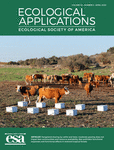
ECOLOGICAL APPLICATIONS
Transforming ecological theory into practice.ECOLOGICAL APPLICATIONS, published by WILEY, is a leading journal in the field of ecology, providing a platform for innovative research that addresses the understanding and management of ecological systems. With an ISSN of 1051-0761 and E-ISSN of 1939-5582, it has established itself as a vital resource for ecologists and environmental scientists since its inception in 1991. Ranked in the top quartile (Q1) for Ecology in 2023 and with a Scopus ranking of 40 out of 461 in Environmental Science, ECOLOGICAL APPLICATIONS boasts an impressive impact factor, attesting to its significance and influence in the field. The journal's mission is to publish peer-reviewed articles that contribute to ecological theory and its applications in conservation and environmental management. Researchers, professionals, and students alike will find invaluable insights and the latest developments in ecological research through its comprehensive scope and rigorous scholarship, ensuring a crucial role in shaping future ecological practices and policies.
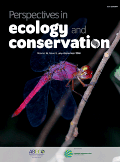
Perspectives in Ecology and Conservation
Elevating the discourse on ecology and sustainable practices.Perspectives in Ecology and Conservation, published by Elsevier Science Ltd, is a leading academic journal dedicated to advancing the fields of ecology, conservation, and environmental management. With a Q1 ranking in multiple categories, including Ecology, Management, Monitoring, Policy and Law, and Nature and Landscape Conservation, this journal boasts an impressive standing among its peers, making it essential reading for researchers and professionals. Since its inception in 2017 and running through 2024, it aims to provide innovative perspectives and critical analyses that enhance our understanding and practices in conservation science. The journal is accessible through open access options, facilitating broader dissemination of knowledge. Its commitment to addressing contemporary ecological challenges reinforces its importance in the academic community, promoting sustainable practices and informed policy-making in the face of urgent environmental issues.

ENVIRONMENTAL SCIENCE AND POLLUTION RESEARCH
Transforming Environmental Insights into Actionable SolutionsEnvironmental Science and Pollution Research is a premier international journal published by Springer Heidelberg, dedicated to advancing knowledge in the field of environmental science and pollution. With an impressive impact factor reflecting its vital contributions to research, the journal is categorized in the top quartiles (Q1 and Q2) across several domains, including Health, Toxicology and Mutagenesis, and Environmental Chemistry. Established in 1994, it continues to be a critical resource for researchers, professionals, and students focusing on pressing environmental issues. The journal provides an insightful platform for disseminating significant findings related to pollution and its effects on health and the environment, contributing to a better understanding and resolution of these challenges. While it currently does not offer Open Access options, its inclusion in prominent rankings, such as the Scopus rankings, underscores its reputation and influence within the scientific community.
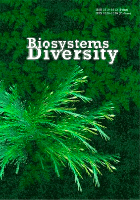
Biosystems Diversity
Empowering Research for a Sustainable FutureBiosystems Diversity is an esteemed open access journal published by the Oles Honchar Dnipro National University since 2009, based in Ukraine. Focusing on a wide array of topics within the fields of Ecology, Evolution, Behavior, and Systematics, the journal aims to foster the dissemination of cutting-edge research and innovative methodologies in understanding biodiversity and ecological interactions. With its ISSN 2519-8513 and E-ISSN 2520-2529, Biosystems Diversity has seen a consistent growth trajectory, earning a Q3 category for Ecology and a Q4 classification for Ecology, Evolution, Behavior and Systematics as of 2023, reflecting its dedication to high standards of scholarly excellence. The journal's rankings in Scopus solidify its relevance in the academic community, providing researchers and practitioners with vital insights into contemporary environmental challenges. As it converges towards its 2024 target, Biosystems Diversity continues to empower scientists, students, and professionals alike to explore new dimensions in the study of biological systems, offering crucial open access options for broader reach and engagement.
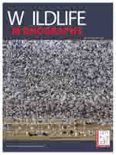
WILDLIFE MONOGRAPHS
Elevating the discourse on ecological and biological sciences.WILDLIFE MONOGRAPHS, published by WILEY, is a prestigious journal dedicated to advancing the understanding of ecological and biological sciences with a keen focus on wildlife conservation and management. With an ISSN of 0084-0173 and an E-ISSN of 1938-5455, this journal has established itself as a leader in its field, ranking in the Q1 quartile for both Ecology, Evolution, Behavior and Systematics and Nature and Landscape Conservation in 2023. The journal's remarkable impact is underscored by its Scopus rankings—46th out of 721 in Agricultural and Biological Sciences and 17th out of 211 in Environmental Science, highlighting the journal's influential role in shaping research discussions and policy in wildlife management. Available in print and online, WILDLIFE MONOGRAPHS publishes comprehensive studies that inform practitioners, researchers, and students alike, fostering a deeper insight into biodiversity and ecosystem dynamics. Founded in 1981, the journal continues to evolve, contributing significantly to the scientific community through rigorous peer-reviewed articles that bridge the gap between theory and practical application in wildlife management.
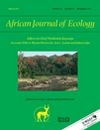
AFRICAN JOURNAL OF ECOLOGY
Advancing Knowledge in Ecology and ConservationThe African Journal of Ecology, published by Wiley, is a leading academic journal in the field of Ecology, Evolution, Behavior, and Systematics. Established in 1963 and continuing its vital contributions to the field until 2024, this journal serves as a premier platform for researchers and scholars to share groundbreaking studies that explore the intricate relationships within ecosystems, particularly in the African context. With an impressive Scopus Rank of #423 out of 721 and a Q3 Quartile ranking, it stands as a credible source of scholarly information, gaining recognition among peers for its rigorous peer-review process and impactful publications. While the journal is not open access, it remains influential in driving advancements in ecological research and providing insights vital for conservation efforts and biodiversity studies. Authors and readers alike will find that the African Journal of Ecology not only promotes scientific inquiry but also fosters a deeper understanding of ecological dynamics that affect our world.
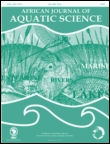
AFRICAN JOURNAL OF AQUATIC SCIENCE
Exploring the depths of biodiversity and conservation.AFRICAN JOURNAL OF AQUATIC SCIENCE, published by TAYLOR & FRANCIS LTD, is a premier scholarly journal dedicated to the field of aquatic science, ecology, and environmental management, playing a crucial role in advancing research and knowledge in these vital areas. With an impressive Q2 ranking in both Aquatic Science and Ecology, Evolution, Behavior and Systematics, the journal seeks to publish high-quality research encompassing a wide range of topics related to freshwater and marine ecosystems, including biodiversity, conservation strategies, and the impacts of climate change. Featuring a rich history of publication from 2000 to 2024, the journal not only embraces rigorous peer review but also aims to foster collaboration and dialogue among researchers, practitioners, and students interested in aquatic environments. Readers will find that the journal’s commitment to impactful scientific communication is reflected in its notable rankings within the Scopus database, making it an essential resource for those engaged in aquatic research and management.

VIE ET MILIEU-LIFE AND ENVIRONMENT
Exploring the Depths of Ecology and Aquatic ScienceVIE ET MILIEU - LIFE AND ENVIRONMENT is a pivotal journal in the realms of aquatic science and ecology, serving as a vital platform for researchers and professionals interested in the interconnections between living organisms and their environments. Published by the esteemed OBSERVATOIRE OCEANOLOGIQUE BANYULS in France, this journal has been disseminating valuable research since its inception in 1980, with volumes covering various topics pertinent to environmental dynamics through to 2024. Despite its current classification in the Q4 quartile for both aquatic science and ecology, the journal offers a unique opportunity for scholars to contribute to niche areas often overlooked by more prominent publications. VIE ET MILIEU is committed to fostering a comprehensive understanding of ecological interactions and the conservation of aquatic ecosystems, making it an essential resource for those engaged in environmental science and biology. Researchers can access a wealth of knowledge that supports their work, encourages collaboration, and inspires innovative approaches to pressing ecological issues.